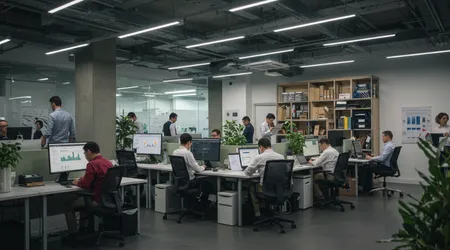The Best Business Incubators That Support Entrepreneurs with Disabilities

Business incubators that support entrepreneurs with disabilities are transforming the entrepreneurial landscape by fostering inclusion and empowering a diverse range of innovators.
In 2025, the job market is evolving rapidly, with entrepreneurship emerging as a powerful avenue for economic empowerment, particularly for individuals with disabilities.
These incubators provide tailored resources, mentorship, and accessible environments, breaking down systemic barriers that have historically limited entrepreneurial opportunities.
Why should society overlook the potential of disabled entrepreneurs when their unique perspectives can drive groundbreaking innovation?
This article explores the top business incubators that support entrepreneurs with disabilities, highlighting their innovative approaches, real-world impact, and why they matter in today’s economy.
The global push for inclusivity has gained momentum, with organizations recognizing the untapped potential of entrepreneurs with disabilities.
According to a 2025 report by Disabled World, 12 disabled founders featured in the book Trailblazing and Transforming: Success Stories of Entrepreneurs with Disabilities overcame systemic barriers to build thriving businesses.
These stories underscore the importance of specialized support systems. Incubators are not just spaces for growth they are lifelines, offering tools, networks, and confidence to navigate a competitive market.
From Northern Ireland to Ethiopia, business incubators that support entrepreneurs with disabilities are redefining success by prioritizing accessibility and equity.
This article dives into the most impactful business incubators that support entrepreneurs with disabilities, offering practical examples, current insights, and actionable advice.
Whether you’re an aspiring entrepreneur or an advocate for inclusion, understanding these programs can unlock new opportunities.
Let’s explore how these incubators are shaping the future of entrepreneurship.
Why Inclusivity Matters in Entrepreneurship
Entrepreneurship thrives on diverse perspectives, yet disabled individuals often face unique challenges like inaccessible workspaces or funding biases.
Business incubators that support entrepreneurs with disabilities address these hurdles directly, creating environments where innovation flourishes.
By offering tailored mentorship and adaptive technologies, they empower entrepreneurs to turn ideas into reality.
Consider Sarah, a visually impaired entrepreneur who, through an incubator’s braille-compatible software training, launched a successful e-commerce platform in 2025.
The economic impact of inclusive entrepreneurship is significant. Incubators foster job creation and innovation by supporting disabled founders who might otherwise be excluded.
++ Inclusive Hiring: What Recruiters Still Get Wrong
Programs like these challenge stereotypes, proving that disability does not limit entrepreneurial potential. Beyond economics, they promote social equity, giving voice to underrepresented communities.
Moreover, these incubators align with global trends toward diversity, equity, and inclusion (DEI). Companies and governments increasingly prioritize DEI, making business incubators that support entrepreneurs with disabilities critical to modern economies.
They ensure that no talent is left behind, fostering a richer, more innovative market.
For instance, a wheelchair-bound entrepreneur in the UK leveraged an incubator’s accessible office space to develop a sustainable packaging startup, showcasing the power of tailored support.

Top Business Incubators for Entrepreneurs with Disabilities
TU Dublin’s Self Employment for Persons with Disabilities Programme
Northern Ireland’s TU Dublin program, launched in 2025, is a beacon for disabled entrepreneurs. It offers tailored training, mentorship, and funding access, emphasizing business idea quality.
With applications open until July 31, 2025, it’s highly competitive, selecting candidates based solely on merit. This program breaks barriers by addressing unique challenges like inaccessible pitching environments.
The program’s hands-on approach includes workshops on adaptive business strategies, such as voice-activated software for those with motor impairments.
Also read: How to Disclose a Disability During a Job Interview (or Not)
Its partnership with local businesses ensures real-world networking opportunities. For example, a deaf entrepreneur used TU Dublin’s sign-language-interpreted mentorship to secure a retail partnership in Belfast.
Early application is crucial due to oversubscription, reflecting the program’s reputation for transformative support.
By focusing on practical skills, it equips entrepreneurs to navigate market challenges confidently.
This initiative proves that business incubators that support entrepreneurs with disabilities can drive systemic change through targeted resources.
STEMpower Ethiopia’s We Can Work Initiative
In Ethiopia, STEMpower’s We Can Work initiative, partnered with Light for the World, graduated trainees in June 2025, equipping them with business skills tailored to their disabilities.
This program offers hands-on training in business development, focusing on accessibility and empowerment. It’s a model for how business incubators that support entrepreneurs with disabilities can transform lives in developing economies.
Participants gain practical knowledge, like financial planning adapted for assistive device users.
For instance, Amina, a trainee with mobility challenges, launched a tailoring business after learning accessible marketing strategies. The program’s emphasis on local market needs ensures sustainable ventures.
Read more: The Best Online Job Platforms with Accessibility in Mind
By fostering self-reliance, We Can Work creates pathways for economic independence.
Its collaborative approach with global partners amplifies its impact, making it a standout among business incubators that support entrepreneurs with disabilities. T
his initiative highlights the global demand for inclusive entrepreneurship support.
Stelios Awards for Disabled Entrepreneurs
The Stelios Awards, hosted by the Stelios Foundation in the UK, gifted £300,000 to three disabled entrepreneurs in June 2025.
This program celebrates resilience, supporting ventures like Umbreen’s nursing home, which improves lives while creating jobs.
It’s a prime example of how business incubators that support entrepreneurs with disabilities can amplify impact through financial backing.
Unlike traditional incubators, Stelios focuses on direct funding, allowing entrepreneurs to scale without bureaucratic hurdles.
Umbreen, who has muscular dystrophy, used her award to expand her staff, enhancing care quality. This approach prioritizes immediate action over prolonged training.
The awards also inspire others, showcasing success stories that challenge societal biases.
By highlighting real-world achievements, Stelios proves that business incubators that support entrepreneurs with disabilities can reshape perceptions and drive economic growth.
Adaptation Ventures: Disability Tech Focus
Adaptation Ventures, launched in the US in May 2025, is the first angel group dedicated to disability and accessibility tech startups.
It fills a funding gap, offering mentorship and investment to innovators creating adaptive technologies.
This makes it a leader among business incubators that support entrepreneurs with disabilities in the tech sector.
For example, a startup developing AI-powered prosthetics received seed funding and mentorship, enabling rapid prototyping.
The program’s focus on niche markets ensures disabled entrepreneurs access specialized resources. Its angel investor network connects founders with industry leaders, fostering growth.
By prioritizing accessibility tech, Adaptation Ventures addresses unmet needs, like affordable assistive devices.
Its innovative model demonstrates how business incubators that support entrepreneurs with disabilities can drive technological and social progress simultaneously.
How These Incubators Drive Success
Incubators provide more than funding they offer mentorship, networking, and adaptive tools tailored to disabled entrepreneurs’ needs.
They create safe spaces where founders can experiment without fear of failure.
A 2025 study found that 62% of disabled entrepreneurs in incubator programs reported higher confidence in scaling their businesses. This statistic highlights their transformative power.
Mentorship is a cornerstone, connecting entrepreneurs with experienced advisors who understand disability-related challenges.
Networking events, often designed with accessibility in mind, open doors to investors and partners. Adaptive technologies, like screen readers or ergonomic workstations, ensure inclusivity.
Imagine a marathon where some runners start with hurdles while others have a clear path. Incubators remove those hurdles, leveling the playing field.
They don’t just support businesses they empower dreams, turning ideas into thriving enterprises.
Table: Key Features of Top Incubators for Entrepreneurs with Disabilities
| Incubator | Location | Key Offerings | Application Deadline | Focus Area |
|---|---|---|---|---|
| TU Dublin | Northern Ireland | Tailored training, mentorship | July 31, 2025 | General entrepreneurship |
| STEMpower | Ethiopia | Business skills, accessibility tools | Rolling | Local market ventures |
| Stelios Awards | UK | Direct funding, recognition | Annual | Scalable businesses |
| Adaptation Ventures | US | Tech-focused funding, mentorship | Rolling | Accessibility tech |
Overcoming Challenges Through Innovation
Disabled entrepreneurs often face inaccessible funding processes or biased investor perceptions.
Incubators counter these by designing inclusive application systems, like voice-activated forms or virtual pitches. They also educate investors on the value of diverse founders, reducing bias.
Physical accessibility is another focus, with incubators providing wheelchair-friendly spaces or remote participation options.
For instance, a paraplegic entrepreneur in Ethiopia used STEMpower’s virtual training to launch a digital marketing firm, bypassing mobility barriers.
These programs also tackle emotional challenges, offering peer support groups to build resilience.
By addressing both practical and psychological barriers, incubators ensure disabled entrepreneurs thrive in competitive markets.
The Future of Inclusive Incubators

As the job market evolves, business incubators that support entrepreneurs with disabilities will play a larger role in shaping inclusive economies.
Governments and corporations are increasingly investing in DEI, with programs like the U.S.-India COMPACT initiative supporting incubator sustainability. This global trend signals a brighter future for disabled entrepreneurs.
Emerging technologies, like AI-driven accessibility tools, will enhance incubator offerings, enabling more personalized support.
Virtual incubators are also rising, making programs accessible to remote entrepreneurs with disabilities. The future is inclusive, and these incubators are leading the charge.
Collaboration between incubators and corporations will further amplify impact.
By partnering with tech giants, incubators can provide cutting-edge resources, ensuring disabled entrepreneurs remain competitive. This synergy will drive innovation and economic growth.
Conclusion: A Call to Action for Inclusion
Business incubators that support entrepreneurs with disabilities are more than programs they are catalysts for change, empowering a new generation of innovators.
From TU Dublin’s tailored training to Adaptation Ventures’ tech-focused funding, these initiatives prove that disability is not a barrier to success.
They foster economic growth, social equity, and innovation, reshaping the entrepreneurial landscape in 2025.
Aspiring entrepreneurs with disabilities should seize these opportunities, applying early to competitive programs like TU Dublin’s.
Allies and investors must advocate for and fund these incubators, ensuring their sustainability.
Together, we can build a world where every entrepreneur, regardless of ability, has the tools to succeed. Will you join this movement for inclusion?
Frequently Asked Questions
What are business incubators that support entrepreneurs with disabilities?
They are programs offering tailored resources, mentorship, and funding to help disabled entrepreneurs launch and grow businesses.
How can I apply to these incubators?
Check specific program websites, like TU Dublin’s, for application details. Deadlines, such as July 31, 2025, are critical.
Are these programs only for tech startups?
No, they support various sectors, from retail to accessibility tech, depending on the incubator’s focus.
What makes these incubators different from general ones?
They provide adaptive tools, accessible spaces, and mentorship addressing disability-specific challenges, ensuring inclusivity.
Can non-disabled entrepreneurs benefit from these programs?
Typically, these incubators prioritize disabled founders, but some offer resources to allies or inclusive ventures.
